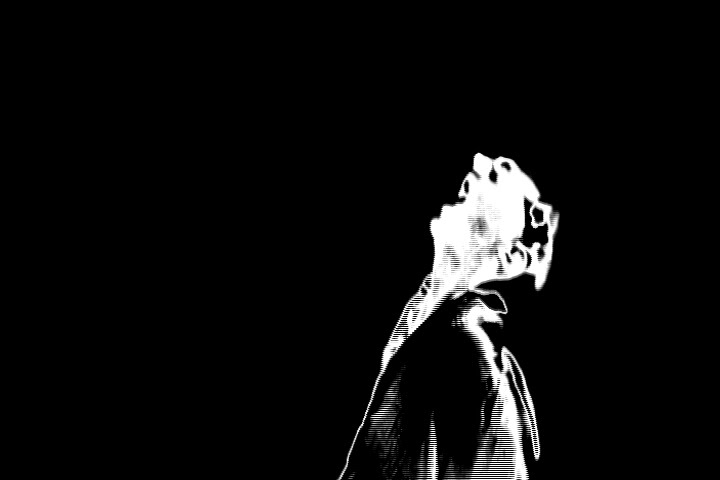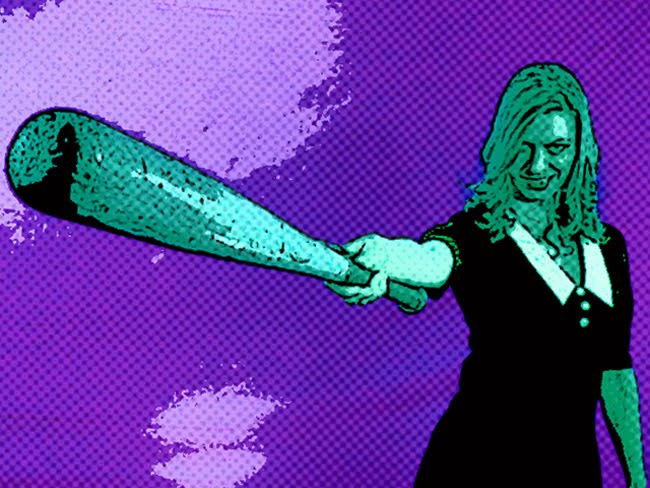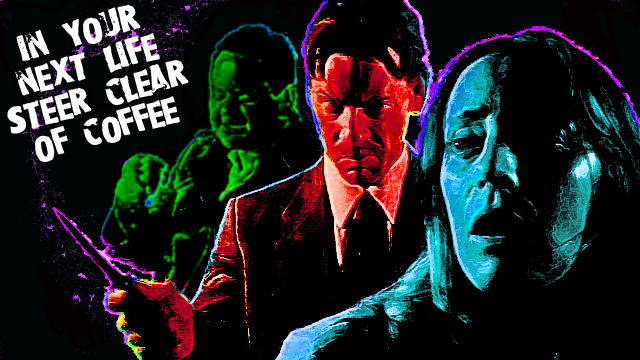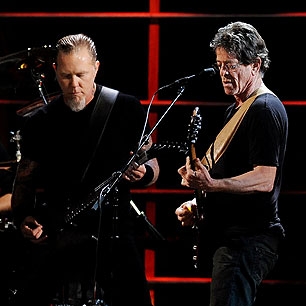Springsteen's SXSW speech and me
 Thursday, March 29, 2012 at 05:58PM
Thursday, March 29, 2012 at 05:58PM 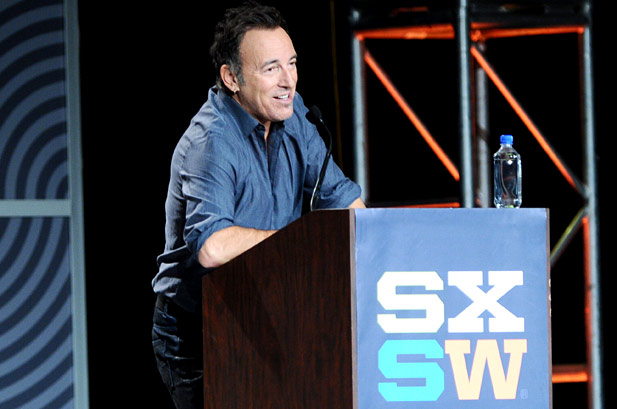
By turns funny and thoughtful, bawdy and shot through with the sex and rebellion of adolescent awakening, Bruce Springsteen's keynote address at South by Southwest is many things. (Not that I was there: I listened to it via the link above). It's advice. It's an education. It is a rock 'n' roll disciple painting poetic, electric thumbnail portraits of his heroes and what they showed him: the level of intensity that's possible, the sense that there is another way to live...a way out. It is also about how the meaning and power of music still stand when you're no longer an adolescent. It kept bringing me back to a point in my life when I was on my own search for identity, and Bruce became my compass. (I guess I'm gonna call him "Bruce" in this, if that's alright with you).
"Music is my savior/I was named by rock & roll/I was maimed by rock & roll/I was tamed by rock & roll/I got my name from rock & roll". That's a line from Wilco, and that's the eternal story Bruce was telling in his speech. And though the reference points would be different for me--and though my times were far more comfortable and sheltered than Bruce's--I felt like he was telling my story. Born in 1971, I found the life-force in my adolescence in the post-punk "alternative" cats: R.E.M., the Replacements, the Talking Heads, the Violent Femmes, and on and on.
It was only later that my story and Bruce's art converged. I was a rather adrift college kid at the end of the 80s when I grabbed Bruce's music like a life preserver. In the years from 18 to 21--the years I became an adult--he started speaking to me deeply, whereas I hadn't been able to relate to him at all as a kid. His speech at SXSW thus recalled for me many nights of very personal, private listening, blasting bootlegs through headphones all night long while writing papers or cramming for exams. These were the same years that I got deeply into film, and Bruce's music was so cinematic: it offered a persona, a stance, just like the movies I'd see trying to "learn how to walk like the heroes we thought we had to be." The movies I was discovering and Bruce's music seemed to echo across each other's skies: Scorsese's "Mean Streets" and Bruce's "Jungleland" intertwined in the landscape of my imagination.
This is a guy who started out where many of the young musicians at SXSW are now, playing in bars, and who went out and proved it night after night after night--all night, every night. But if the unspoken story of the speech was that of a young fan listening to the titans who grew up to take his place as one of them, Bruce crucially found that he could never be the Center of It All in the 70s and 80s, the way Elvis or the Beatles had been before. For the animating spark of his speech he looked to the famous concluding paragraph of Lester Bangs's "Where Were You When Elvis Died?", words that always moved me tremendously:
"If love truly is going out of fashion forever, which I do not believe, then along with our nurtured indifference to each other will be an even more contemptuous indifference to each others' objects of reverence. I thought it was Iggy Stooge, you thought it was Joni Mitchell or whoever else seemed to speak for your own private, entirely circumscribed situation's many pains and few ecstasies. We will continue to fragment in this manner, because solipsism holds all the cards at present; it is a king whose domain engulfs even Elvis's. But I can guarantee you one thing: we will never again agree on anything as we agreed on Elvis. So I won't bother saying good-bye to his corpse. I will say good-bye to you."
In his speech, Bruce showed how right Lester was even as he turned his formulation on its head. We are hopelessly fractured and sectarian now. There is no consensus figure: for every would-be titan who might seem to you the embodiment of what it's all about, there's someone out there to proclaim, "They suck!" (Bruce intones these words with withering glee, especially when turning them back on himself). By the time I came along I was into "alternative," whereas for Bruce rock & roll itself had been the alternative. If anything, though, when Bruce spewed out that bravura litany of far-flung rock splinters and sects--pausing only to ponder something called "Nintendo core"--the point was to diagnose the hilarious health of the scene.
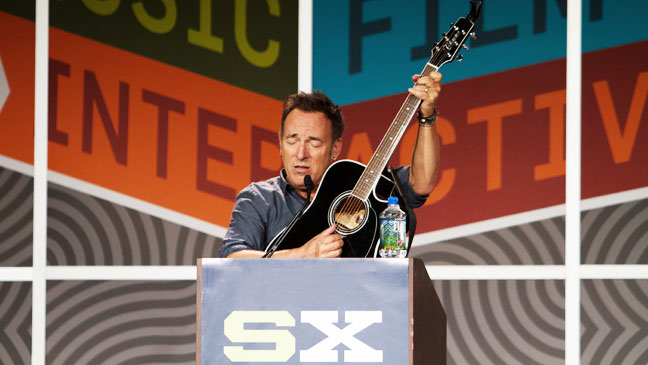
When he talked about how much the Animals meant to him--by far the most important British invasion band for him, it seems--it took me straight back to hearing him do "It's My Life" on one of my bootlegs. Just like he says, the song fit perfectly with the cataclysmic, punk-influenced "Darkness on the Edge of Town" material. This song was not an "oldie" the way Bruce played it: this was life or death. This singer was saying, listen: this is MY story.
"It's my life, and I'll do what I want...It's my life and I'll think what I want." I remember sitting stunned and exhilarated by the sheer force with which he spit out that "Don't PUSH ME!!" (And that "Show me I'm wrong" line--the one Bruce says blew him away--that always knocked me out as well.)
The Animals brought class consciousness to rock & roll, the same way Bruce brought a budding class-consciousness to me in the years we've been talking about. (I didn't come by it organically: though I've worked some physical jobs, the specter of, say, a factory life should I play my cards wrong never loomed.) Picking up his axe, Bruce gave us a little songwriting workshop, fascinating for a non-songwriter such as myself, on creative "theft". The rhythm of the Animals' version of "(Please Don't Let Me Be) Misunderstood" became the framework for "Badlands".
He talked about turning to country music as he grew up--that is, adult music. Same as it was Bruce's attempts to bring adult subject matter to rock & roll that struck such a chord with me as I became an adult. Bruce explained why he needed both Hank Williams and Woody Guthrie: Hank said "My bucket's got a hole in it," but he didn't say why. He never went there, maybe couldn't go there. Woody supplied the "why".
He wrapped up the speech with an idea I got from him--or maybe from reading Dave Marsh thinking about him (in my search for identity and my place in the world--I suppose what I've been describing is a resurrection--there was Bruce, there was film, and there was Dave's writing). I tried to use it when writing papers at the time, and I've tried to hold onto it to this day when doing any kind of critical thinking: "Be able to keep two completely contradictory ideas alive and well inside of your heart and head at all times. If it doesn't drive you crazy, it will make you strong." And then he showed what it might mean to do just that: "When you walk onstage tonight to bring the noise, treat it like it's all we have. And then remember, it's only rock and roll."
Looking around at the committed young bands at SXSW, Bruce showed Lester he was wrong in a way that I'm sure would thrill the man's great heart. Solipsism does not reign. We're still out here, fractured though we may be. And, to paraphrase Wilco again, we still love rock & roll.


